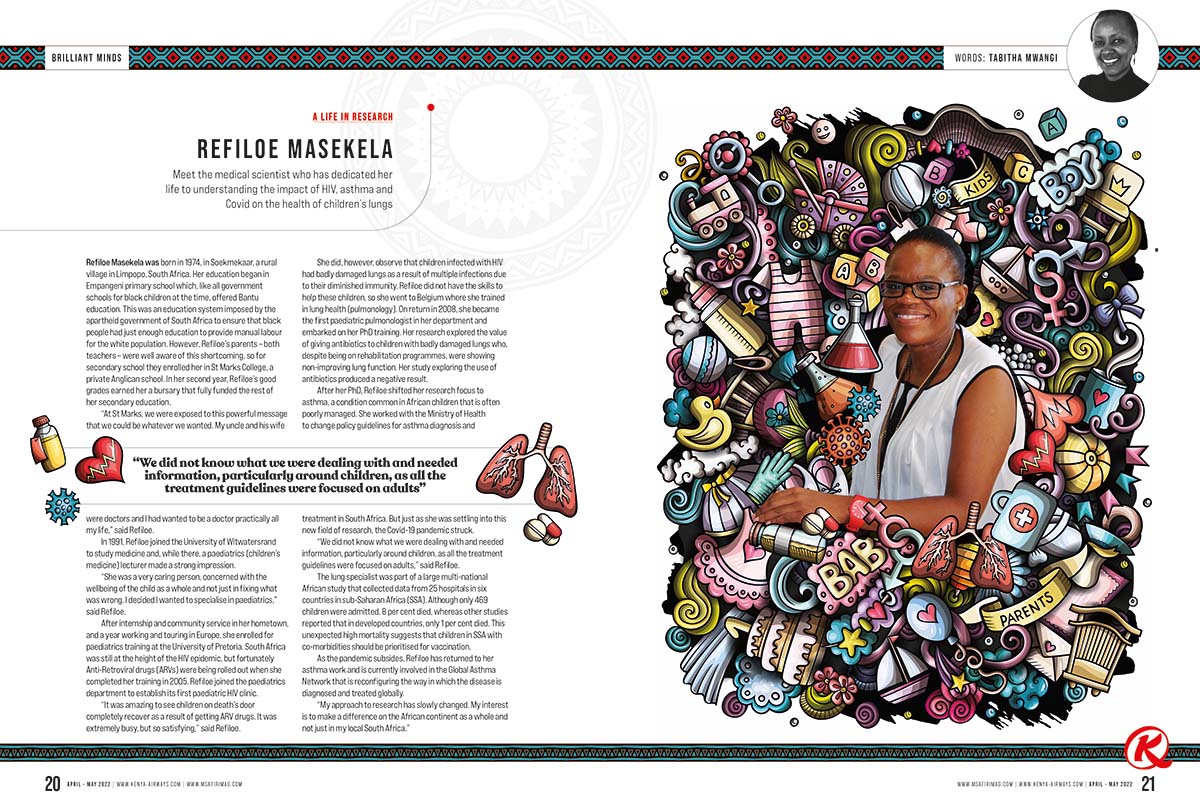A Life in Research - Refiloe Masekela

Written by Dr Tabitha Mwangi, Cambridge Africa Programme Manager, University of Cambridge and published in Kenya Airways magazine
Meet the medical scientist who has dedicated her life to understanding the impact of HIV, asthma and COVID-19 on the health of children’s lungs
Refiloe Masekela was born in 1974, in Soekmekaar, a rural village in Limpopo, South Africa. Her education began in Empangeni primary school which, like all government schools for black children at the time, offered Bantu education. This was an education system imposed by the apartheid government of South Africa to ensure that black people had just enough education to provide manual labour for the white population. However, Refiloe’s parents – both teachers – were well aware of this shortcoming, so for secondary school they enrolled her in St Marks College, a private Anglican school. In her second year, Refiloe’s good grades earned her a bursary that fully funded the rest of her secondary education.
“At St Marks, we were exposed to this powerful message that we could be whatever we wanted. My uncle and his wife were doctors and I had wanted to be a doctor practically all my life,” said Refiloe.
In 1991, Refiloe joined the University of Witwatersrand to study medicine and, while there, a paediatrics (children’s medicine) lecturer made a strong impression.
“She was a very caring person, concerned with the wellbeing of the child as a whole and not just in fixing what was wrong. I decided I wanted to specialise in paediatrics,” said Refiloe.
After internship and community service in her hometown, and a year working and touring in Europe, she enrolled for paediatrics training at the University of Pretoria. South Africa was still at the height of the HIV epidemic, but fortunately Anti-Retroviral drugs (ARVs) were being rolled out when she completed her training in 2005. Refiloe joined the paediatrics department to establish its first paediatric HIV clinic.
“It was amazing to see children on death’s door completely recover as a result of getting ARV drugs. It was extremely busy, but so satisfying,” said Refilo.
She did, however, observe that children infected with HIV had badly damaged lungs as a result of multiple infections due to their diminished immunity. Refiloe did not have the skills to help these children, so she went to Belgium where she trained in lung health (pulmonology). On return in 2008, she became the first paediatric pulmonologist in her department and embarked on her PhD training. Her research explored the value of giving antibiotics to children with badly damaged lungs who, despite being on rehabilitation programmes, were showing non-improving lung function. Her study exploring the use of antibiotics produced a negative result.
After her PhD, Refiloe shifted her research focus to asthma, a condition common in African children that is often poorly managed. She worked with the Ministry of Health to change policy guidelines for asthma diagnosis and treatment in South Africa. But just as she was settling into this
new field of research, the COVID-19 pandemic struck.
“We did not know what we were dealing with and needed information, particularly around children, as all the treatment guidelines were focused on adults,” said Refiloe.
The lung specialist was part of a large multi-national African study that collected data from 25 hospitals in six countries in sub-Saharan Africa (SSA). Although only 469 children were admitted, 8 per cent died, whereas other studies reported that in developed countries, only 1 per cent died. This unexpected high mortality suggests that children in SSA with co-morbidities should be prioritised for vaccination.
As the pandemic subsides, Refiloe has returned to her asthma work and is currently involved in the Global Asthma Network that is reconfiguring the way in which the disease is diagnosed and treated globally.
“My approach to research has slowly changed. My interest is to make a difference on the African continent as a whole and not just in my local South Africa.”

